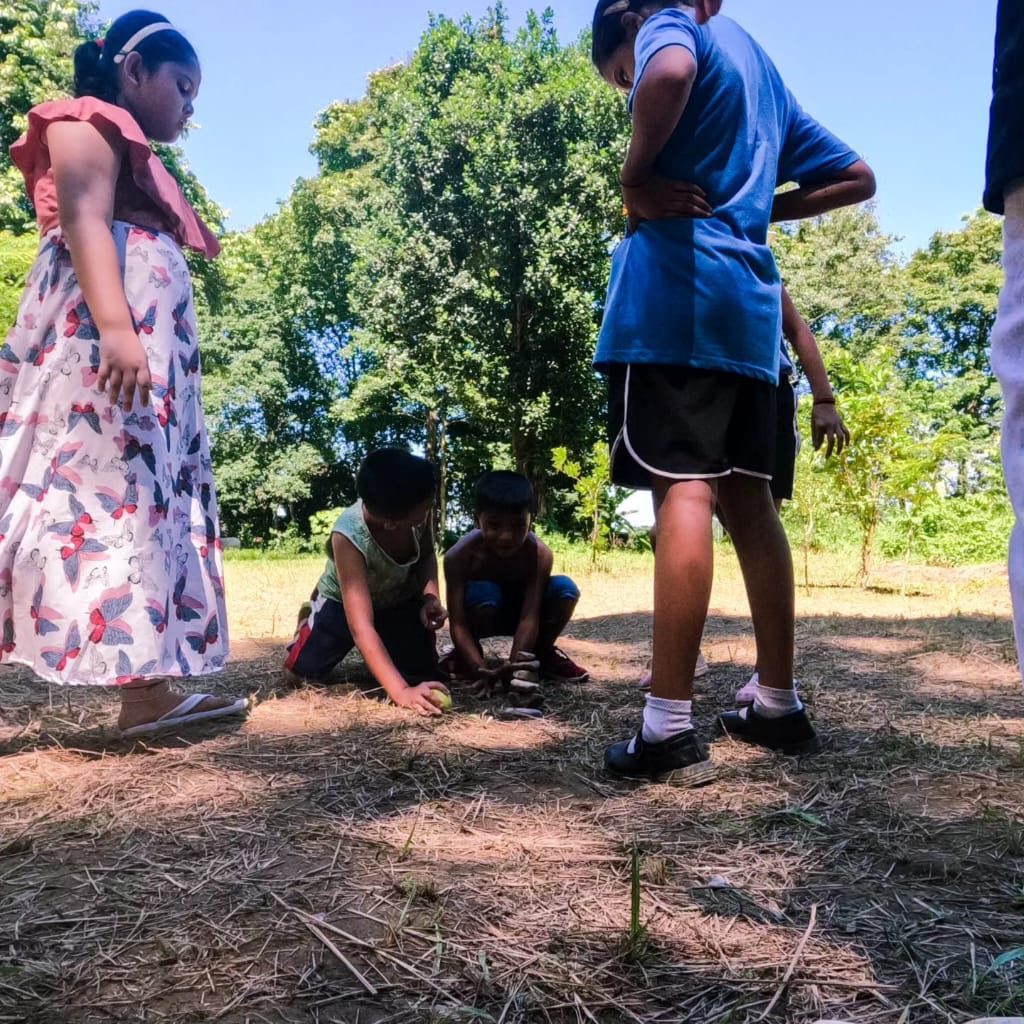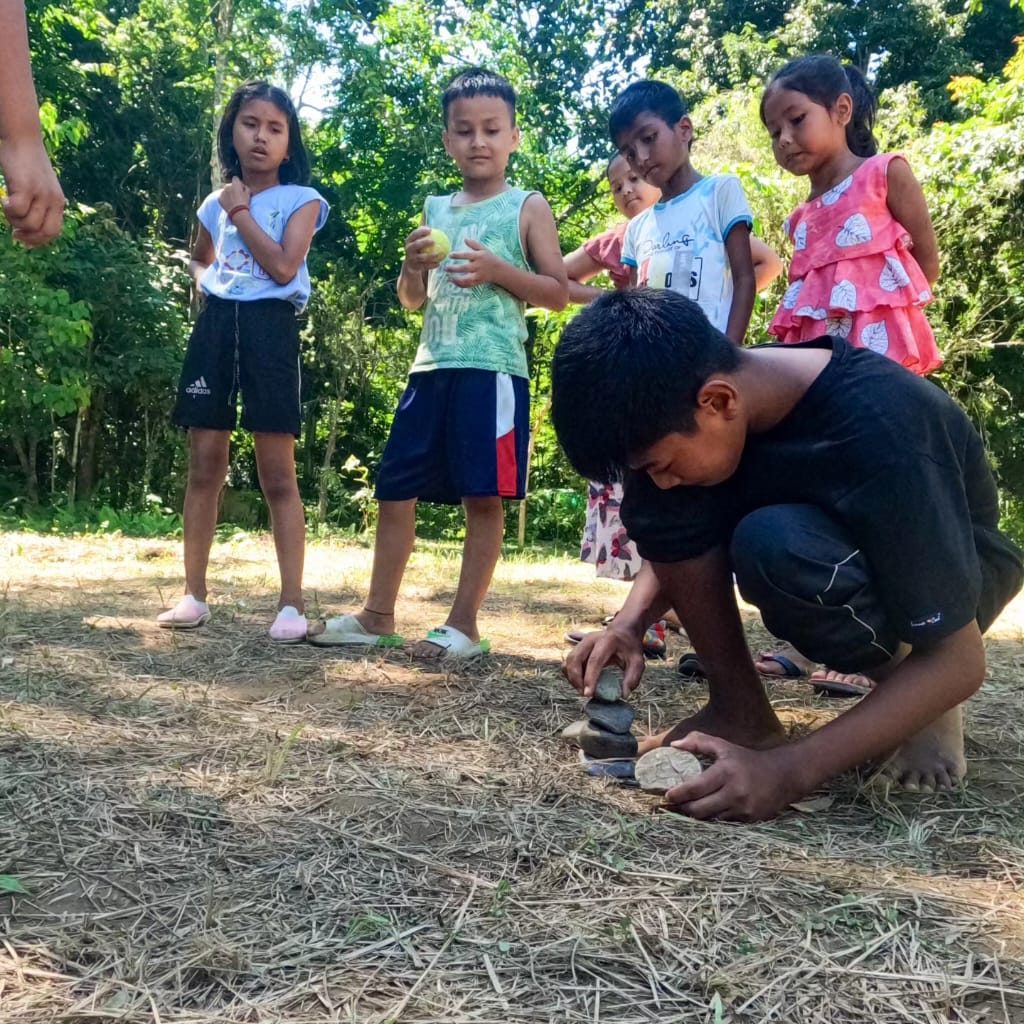In today’s digital age, screen addiction has become a growing concern, with constant dopamine-inducing stimuli taking a toll on our well-being. Our brains have become accustomed to seeking out this fleeting sense of pleasure, leaving us trapped in a cycle of addiction with little to no real benefit. Additionally, excessive screen exposure has adverse effects on our sensory organs, leading to gradual deterioration. Constantly staring at screens strains our eyes, contributing to fatigue and discomfort, while our tactile and auditory senses often remain underutilized. However, there’s hope amidst the digital overload: outdoor play offers a refreshing antidote, rejuvenating our senses and fostering a deeper connection with nature.
WHY IS OUTDOOR PLAY NECESSARY?
Outdoor play is more than just recreation; it’s essential for holistic development.

Promotes physical health and well-being:
Outdoor play encourages physical activity, helping children and adults stay active and maintain healthy lifestyles. It boosts immunity and supports overall fitness, reducing the risk of obesity and related health issues.
Enhances mental health and reduces stress:
Spending time outdoors reduces stress levels and improves mood. Nature’s tranquility provides a therapeutic environment, reducing anxiety and depression symptoms.
Fosters social skills and teamwork:
Outdoor play promotes social interaction and teamwork, essential for developing communication and collaboration skills. It encourages empathy, cooperation, and conflict resolution.
Stimulates creativity and imagination:
The open-ended nature of outdoor play sparks creativity and imagination. Children engage in imaginative play, problem-solving, and exploration, enhancing cognitive development.
Connects individuals to nature and promotes environmental awareness:
Outdoor play fosters a connection with nature, instilling environmental awareness and a sense of stewardship. It cultivates appreciation for the natural world and inspires eco-friendly behaviors.
Engaging in outdoor activities offers a multitude of benefits for individuals of all ages.
Improved physical fitness and motor skills development:
Outdoor play helps children develop gross motor skills such as running, jumping, and climbing, as well as fine motor skills like digging, pouring, and building with natural materials.
Enhanced mood and reduced anxiety:
Spending time in nature improves mood and reduces feelings of anxiety and depression. The sights, sounds, and smells of the outdoors create a calming effect that promotes emotional well-being.
Development of communication and problem-solving skills:
Outdoor play encourages communication, collaboration, and problem-solving as children interact with their peers and navigate their environment. Whether it’s negotiating the rules of a game, resolving conflicts, or finding creative solutions to challenges, outdoor activities provide opportunities for social and cognitive development.
Opportunities for exploration and discovery:
The natural world is full of wonders waiting to be explored. Outdoor play encourages curiosity, exploration, and discovery as children investigate plants, animals, rocks, and other elements of the environment.
Cultivation of a sense of wonder and appreciation for the natural world:
Spending time outdoors fosters a sense of wonder and appreciation for the beauty and diversity of the natural world. Whether it’s watching a sunset, listening to the sounds of the forest, or feeling the wind on your face, outdoor play provides opportunities for awe and inspiration.
TIMELESS TRADITIONS OF TRADITIONAL GAMES:
Traditional games serve as guardians of cultural heritage, preserving centuries-old traditions.

Traditional games are an important part of cultural heritage, passing down customs, values, and traditions from one generation to the next. By playing traditional games, children and adults connect with their cultural roots and learn about the history and heritage of their community.
Promotes social interaction and community bonding:
Traditional games bring people together, fostering social interaction and community bonding. Whether it’s a game of tag in the park, a round of marbles in the schoolyard, or a game of chess in the town square, traditional games provide opportunities for people of all ages to come together, have fun, and build relationships.
Encourages physical activity and healthy competition:
Many traditional games involve physical activity and healthy competition, promoting fitness and sportsmanship. From running and jumping to throwing and catching, traditional games provide opportunities for children and adults to exercise and compete in a friendly and supportive environment.
Enhances cognitive skills and strategic thinking:
Traditional games stimulate cognitive skills such as memory, concentration, and strategic thinking. Whether it’s solving puzzles in games like scavenger hunt, or strategizing in a game of tag, traditional games provide mental stimulation and challenge.
Provides a sense of nostalgia and connection to the past:
Playing traditional games evokes a sense of nostalgia and connection to the past, reminding us of simpler times and cherished memories. Whether it’s reliving childhood games with friends and family or discovering new games from different cultures, traditional games provide opportunities for reflection and connection.
Also, playing traditional games cultivates cultural appreciation, strengthens relationships, and fosters a sense of belonging within communities.
Cultivates cultural appreciation and identity:
Traditional games are an important part of cultural heritage, helping to preserve customs, traditions, and values from one generation to the next. By playing traditional games, children and adults learn about the history, culture, and identity of their community.
Strengthens interpersonal relationships and teamwork:
Many traditional games involve cooperation, collaboration, and teamwork, promoting social skills and building relationships. These games provide opportunities for communication, cooperation, and camaraderie.
NATURE DEFICIT DISORDER AND MENTAL HEALTH:
In modern society, many individuals suffer from nature deficit disorder, a term coined in 2005 by Richard Louv in his book, “Last Child in the Woods: Saving Our children from Nature-Deficit Disorder”, to describe the disconnect between people and the natural world. This disconnection has been linked to various mental health issues, including anxiety, depression, and stress. Spending time outdoors and engaging in traditional games can help alleviate these symptoms by providing a much-needed connection to nature and fostering a sense of well-being and belonging. Additionally, traditional games promote social interaction and strengthen relationships, reducing feelings of loneliness and isolation.
The prevalence of screens and digital devices has led to a detachment from loved ones and a culture of consumerism. Traditional outdoor games offer a remedy to these societal issues by encouraging face-to-face interaction, promoting quality time spent with family and friends, and fostering a sense of community. By engaging in simple, outdoor activities, individuals can break free from the cycle of consumerism and rediscover the joy of shared experiences and meaningful connections.
In a world dominated by screens and digital distractions, outdoor play and traditional games offer a beacon of hope. By reconnecting with nature, embracing timeless traditions, and fostering social bonds, individuals can find solace, joy, and fulfillment. Let us prioritize outdoor play and traditional games as essential components of a balanced and fulfilling life, enriching our physical, mental, and emotional well-being in the process.





Comment (0)